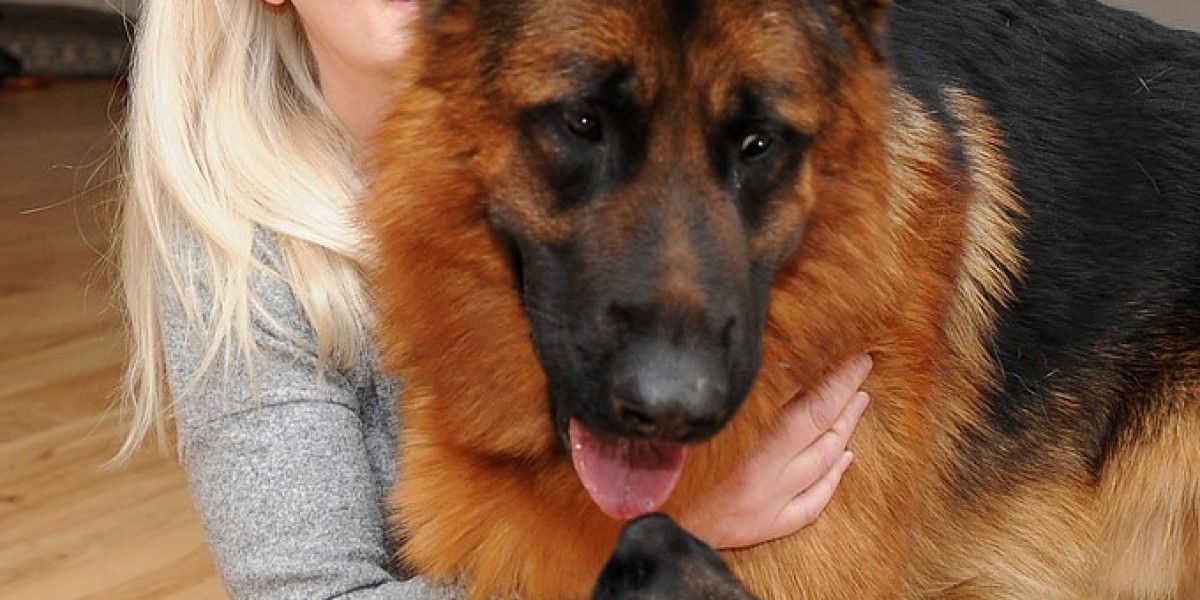German Shepherds are employed in a variety of scent-work roles like cadaver search as well as narcotics and explosives detection. These roles require extensive obedience and protection training.
 Responsible breeders pair up their top adult dogs, clear them for genetic health issues, and raise puppies in optimal conditions. These breeders charge a premium rate for their services.
Responsible breeders pair up their top adult dogs, clear them for genetic health issues, and raise puppies in optimal conditions. These breeders charge a premium rate for their services.Health
Old German Shepherd Dogs are healthier than modern German Shepherd Dogs, because they were bred for work and to herd, rather than for looks. They are also less likely to develop hereditary conditions like elbow dysplasia or hip dysplasia due to the absence of inbreeding for appearance that has plagued modern GSDs. That said, you should still ask about genetic health tests when you purchase an older German Shepherd.
To keep your aging German Shepherd in good health It is essential groom it frequently, brush its teeth, and have an annual dental check-up. Their fur can get caught up in your furniture, clothes and carpets. They shed throughout the year. A good brushing regimen and lint-roller can help to reduce shed and help keep the coat healthy. Trim their claws regularly to prevent them from becoming too large, which can cause discomfort and pain. Also, be aware that as they age they may develop joint issues. This includes osteoarthritis (a joint-related inflammation of the long bone) and Hypertrophic Osteochondrosis Dissecans (HOD). HOD is a genetic condition that affects young dogs and causes joint pain, swelling as well as fever, lameness, and a decrease in appetite. You can prevent it by feeding your GSD low-calcium diets and providing joint-protection supplements like glucosamine chondroitin and MSM.
These big strong dogs require daily exercise to burn off excess energy and remain happy and healthy. That may be as simple as taking them on a walk or letting them play in the yard or at the park with their favorite toys or playing fetch in the home. You should always split their food into two portions to prevent gastric dilation or volvulus, which are common in deep-chested large breeds like GSDs.
Old German Shepherds are loving and loyal companions. However, they also have a strong desire to hunt. This can be a problem for small pets and children if they are not controlled through early socialization and obedience training. They are also protective towards their owners and family, Entzückende Schäferhund Welpen which could lead to aggression and barking when they are not well-trained and socialized.
Training
German Shepherds are intelligent extremely trained and excel in a variety of work-related disciplines. They are highly energetic and eager to learn, so they require a patient and caring owner who is consistent and firm. To stay healthy, happy and focused they must be physically and mentally active all day.
They are herding dogs by nature, and with right training, they can be excellent service and police dogs. They are also excellent companions for children of all ages if they are socialized from an early age. They may be a little more aloof with strangers than happy-golucky breeds like Golden Retrievers, but they will respect their owners and follow commands.
It is important to remember that German Shepherds are naturally inclined to protect their owners and their possessions, even if they are not in danger. It is crucial to get your dog professionally-trained (and before the critical 16-week timeframe). A German Shepherd that is confident and well-trained will be able to tell the difference between someone walking down the street and one who is trying to break into your home.
A GSD's love for food is another thing to think about. They are more prone to eating too much due to their strong herding inclinations. They also need to be taught to manage their food intake to avoid overweight. This can be achieved through regular exercise, which helps to keep them physically fit and manages their weight. It can also keep their brains active which decreases the risk of boredom and aggression. This can be accomplished by using structured training disguised as fun that stimulates their brain and body. This will increase their ability to focus and work under pressure, in a chaotic environment like busy streets and competitions. This is because it will help students to concentrate their focus on the task at hand and avoid distractions. It's a technique similar to the one employed by athletes in high-pressure situations to maintain their peak performance.
Socialization
As with all dogs, it is important to socialize your Old German Shepherd Dog from a young age so that they are content and confident. This can help to prevent future issues with behaviour, such as fearfulness and aggression, and also help to build a strong relationship with you. The process of socialization should begin early in puppyhood and continue throughout their development. Ask a canine behaviourist or an instructor who is certified to give you advice on how to socialize your puppy.
The dog's personality and his history will determine the time it takes to train him. Some dogs require more time and patience in training, whereas others are quick learners. Always use positive reinforcement to reinforce successful outcomes and keep training sessions short and consistent. This will improve your dog's ability to learn and internalize commands.
Like all dogs, it's also crucial to ensure that you provide your Old German Shepherd Dog with daily exercise. This will keep your dog's Old German Shepherd physically and mentally stimulated and ensure they are physically fit enough to enjoy their golden years. This could include regular walks as well as playtime that is safe and structured training. If you're not sure the amount of exercise your dog requires talk to your fitness trainer or vet.
It is important to get your German Shepherd Dog with children and other animals from a young age due to their instincts to protect. This will make them more sociable and calm with strangers. It will also reduce the tendency for them to be anxious or bark at strangers or in unfamiliar places. It is recommended to introduce your puppy to other dogs and children in a controlled environment when they are young so that they develop an enjoyable relationship from an early age.
Although the Old German Shepherd breed has a less pronounced history of inbreeding than its more standard counterpart, they have some common health issues, such as hip and elbow dysplasia, degenerative myelopathy, dilated cardiomyopathy, anal furunculosis, and gastric dilation volvulus (GDV). Heat strokes are another problem that should be kept out of direct sunlight during the summer heat.
Exercise
German Shepherds are energetic dogs that require lots of daily exercise to keep them healthy and happy. healthy. They require a mixture of walks, off-leash playing in a safe area, agility training, and even games such as tug-of-war, to fulfill their physical and mental exercise needs.
These intelligent, working breeds will become restless when they don't have an outlet for their energy. This can lead them to engage in a variety of undesirable behaviors such as digging into your yard or re-decorating the living space with everything they are able to reach. And then there's the anger that their owners and neighbours. Exercise is a great method to channel your dog's energy and keep them from being bored or destructive.
When you exercise an older German Shepherd Dog it's important to be aware of their limitations. They might not be able to take long runs or play fetch as they used to when they were younger. They might also get tired faster or be less enthusiastic about these activities. If you notice signs such as excessive panting or lag time when walking or running, or an absence of interest in the activity, you should stop and allow them to recover.
Even though your German Shepherd is no longer able to go on long walks or play fetch, he could still benefit from other activities such as tug-of war and swimming. These exercises aren't just easy on their joints and joints, but they can also help them burn excess energy.
Massage is another excellent way to strengthen the muscles of your German Shepherd. This simple exercise can help reduce stiffness and pain while strengthening your bond with them. Start small and gradually increase the time you spend massaging their necks, shoulders and spine.
In general, an older German Shepherd requires at minimum two hours of physical activity each day. Playtime and training will be added to this for the sake of keeping their body and mind active. This can be done at short intervals throughout the day or in the evenings when they are the most active.








